Speaker Bios - Barnett Chair Symposium
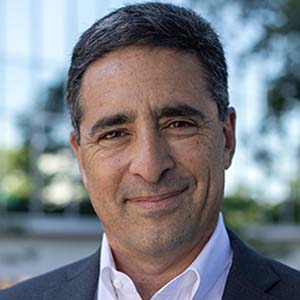 David Angel
David Angel
Assistant District Attorney
Office of the District Attorney, County of Santa Clara
David Angel joined the District Attorney’s Office as a misdemeanor trial attorney in January of 1995. The beginning of his career was marked by trial work including sexual assault, child abuse, domestic violence and mortgage and bank fraud. He then shifted to working on issues related to addiction, mental health and public safety. He was central in developing the county’s Drug Treatment Court and Mental Health Court and has lectured widely in these areas. In 2004, he formed one of the first Conviction Integrity Units in the country. He has exonerated seven individuals who had been wrongly convicted of crimes ranging from child abduction, drive-by-shootings and rape. His focus is on criminal justice reform including, eyewitness identification, body worn cameras, false confessions, prosecutorial misconduct, and the problems associated with over-incarceration, the mentally ill enmeshed in the criminal justice system and cash bail. He also worked to create the new Santa Clara County narcotics policy whereby the District Attorney will no longer file criminal charges against the vast majority of people arrested for recreational drug use and possession. This led to tens of thousands of fewer prosecutions since 2019 when the policy was initiated. Currently, he is working heavily on data issues including the Racial Justice Act and the death penalty.
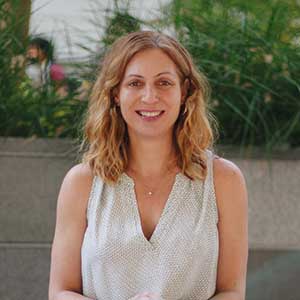 Lara Bazelon
Lara Bazelon
Professor
University of San Francisco School of Law
Lara Bazelon is a Professor at the University of San Francisco School of Law where she directs the Criminal & Juvenile and Racial Justice Clinics and holds the Philip and Muriel Barnett Chair in Trial Advocacy. Since 2022, she has served as the Law School’s Dean of Scholarship. She is the author of the nonfictions books Rectify: The Power of Restorative Justice After Wrongful Conviction (Beacon Press 2018) and Ambitious Like a Mother (Little Brown 2022) as well as numerous essays, op-eds, and long-form journalism pieces. Her work has been published in The New York Times, The Washington Post, The Atlantic Magazine, and New York Magazine, among other outlets.
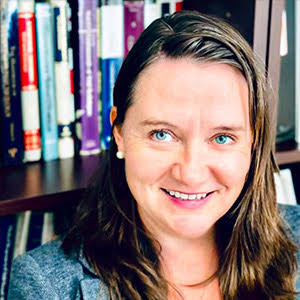 Rebecca Brackman
Rebecca Brackman
Assistant Public Defender, Post Conviction & Strategic Litigation Unit
Contra Costa Public Defenders
Rebecca Brackman joined the Contra Costa County Public Defender's office in 1998, following receipt of her bachelor's degree from the University of Michigan and her JD from Indiana University Law School.
Her work has been in the litigation of serious felony cases, including sexual assaults, homicides and capital cases. For the last several years, she has served in the role of Forensic Resource Attorney for her office, consulting with and preparing colleagues, developing resources and providing ongoing training in forensics. In this context, she has represented clients seeking conviction integrity review and exonerations.
She also recently became the head of the office's inaugural post-conviction unit, supervising holistic resentencing representation of clients serving state prison commitments.
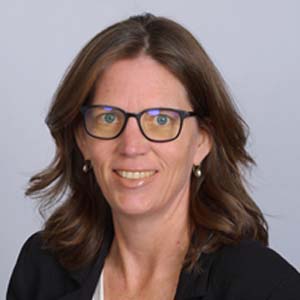 Kate Chatfield ’06
Kate Chatfield ’06
Chief of Staff
California State Senator Nancy Skinner
Kate is the Chief of Staff for California State Senator Nancy Skinner and was the Chief of Staff for San Francisco District Attorney Chesa Boudin. Prior to that, Kate was a criminal defense attorney and worked as a legislative advocate for criminal justice reform, including parole reform and second look resentencing. Kate was the lead drafter and organizer for Senate Bill 1437 (Skinner 2018), which amended California’s felony murder rule and other common law doctrines related to accomplice liability for homicides. There have been over 1000 people in California who have been released from prison after being re-sentenced under SB 1437. Kate graduated from USF School of Law in 2006.
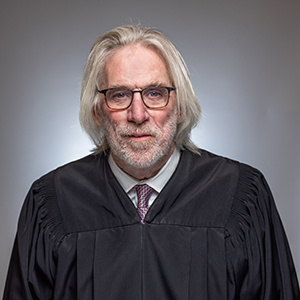 Brendan Conroy
Brendan Conroy
Judge
Superior Court of San Francisco County
Judge Brendan Conroy is a graduate of San Francisco State University BA, History, 1980. He graduated from the former Hastings College of the Law in 1984. He was a deputy public defender in both Los Angeles and San Francisco for 5 years, and then in private practice for twenty years, handling criminal matters and civil commitment proceedings in both state and federal court. He was a member of the indigent defense panels in both state and federal court during that time. He has been a judge in San Francisco since 2021, in his 11th year on the bench. He has been assigned to the Hall of Justice during that entire time, handling all types of criminal cases. He was the supervising judge of the criminal division in 2018. He currently handles felony trials and re-sentencing Petitions.
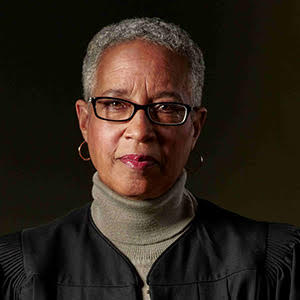 Judge LaDoris Hazzard Cordell (Ret.)
Judge LaDoris Hazzard Cordell (Ret.)
LaDoris Hazzard Cordell, a 1974 graduate of Stanford Law School, was the first lawyer to open a law practice in East Palo Alto, a low-income community of color. In 1978, she was appointed Assistant Dean for Student Affairs at Stanford Law School, where she implemented a successful minority admissions program. In 1982, Governor Jerry Brown appointed Ms. Cordell to the Municipal Court of Santa Clara County making her the first African American woman judge in northern California. In1988, Judge Cordell won election to the Superior Court of Santa Clara County.
In 2001, she retired from the bench to become Vice Provost & Special Counselor to the President for Campus Relations at Stanford University. She left that position in 2009. In 2003, accepting no monetary donations, Judge Cordell ran a grassroots campaign and won a 4-year term on the Palo Alto City Council.
Judge Cordell was the Independent Police Auditor for the City of San Jose for five years (2010-2015). Under her leadership, the office gained national prominence. In 2016, Judge Cordell chaired a Blue-Ribbon Commission in Santa Clara County that investigated the jails in the aftermath of the murder of an inmate by jail guards; she also served on a Blue Ribbon Panel that evaluated the culture of the San Francisco Police Department after racist and sexist text messages surfaced. In 2018, Judge Cordell was the voice of the opposition and campaigned vigorously against the recall of Judge Aaron Persky.
Judge Cordell has been an on-camera legal analyst for CBS-5 television and a guest commentator on Court TV, MSNBC, CNN, as well as National Public Radio. She is the co-founder of the African American Composer Initiative. (www.aacinitiative.org).
Judge Cordell is a mother who lives in Palo Alto with her partner of 30+ years. In her spare time, Judge Cordell is a pianist, vocalist, portrait artist, cartoonist. Her recently released memoir, Her Honor, a finalist for the California Book Award, is published by Celadon, a division of Macmillan Publishing.
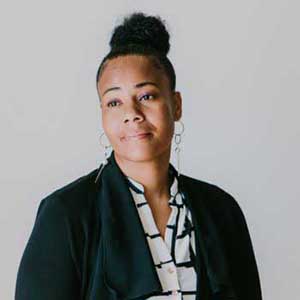 LaNaisha Edwards
LaNaisha Edwards
CA CSSJ Member Engagement Associate
Alliance for Safety and Justice
LaNaisha Edwards is our CA CSSJ Member Engagement Associate and recently earned her Master Certificate in Restore Justice at Vermont Law school with the goal of advocating for more Restorative programs within the justice system and impacted communities. She is a survivor of multiple violent crimes, activist, restorative justice practitioner and advocate. Since the murder of LaNaisha younger brother she continued to share her story publicly with the goal of showing their is healing in storytelling. She is dedicated to creating opportunities for transformation and healing for everyone impacted by violence including people who have been harmed and people responsible for harm. LaNaisha supports victims/survivors in elevating their voices in many areas; local, and state policy in advocating for change. She consults, trains, and supports survivors with their media present and understanding it is important for victims/survivors to share their own narratives.
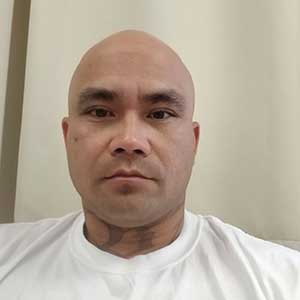 Tony Huynh
Tony Huynh
Post Conviction Justice Project Client
After 17 years of incarceration, in February 2024, Tony was resentenced by Judge Daniel J. Lowenthal, in one of the earliest AB 600 resentencing hearings in the state of California. Tony’s turning point came when he realized the importance of personal growth and rehabilitation. Tony believes that being resentenced offered him a valuable second chance to rebuild his life and contribute positively to society.
While incarcerated, Tony dedicated himself to personal growth and rehabilitation. He participated in various educational programs, earning his GED, and taking college courses to further his knowledge. Tony also became involved in counseling and support groups, both as a participant and a mentor, helping others navigate their own paths to recovery. Additionally, he worked in the prison’s vocational training programs, gaining valuable skills that he hopes to use in his future career.
Since being released, Tony has continued his commitment to personal growth and community service. He is currently working with Asian Pacific Islander Rise (API RISE) and Street Cred, a local nonprofit organization that supports individuals transitioning from incarceration, providing mentorship and guidance to help them reintegrate into society. Tony is also an active member of several support groups, where he shares his experiences and offers encouragement to others on their recovery journeys. Additionally, he is pursuing higher education at California State University, majoring in Communication. Tony enjoys going to school, working out, spending time with family and friends, and engaging in community service. He finds joy in learning new things and staying active, both physically and socially. Tony values the time he spends with loved ones and is passionate about giving back to his community through various volunteer activities.
 Brooke Jenkins
Brooke Jenkins
District Attorney
San Francisco County
Brooke Jenkins, who is Black and Latina, is the second woman of color to serve as San Francisco District Attorney, joining Vice President Kamala Harris as barrier-breaking prosecutors. She is the first Latina District Attorney in San Francisco’s history. Jenkins brings over 15 years of experience as an attorney, working for years in private practice and serving as the Assistant Director of Enforcement for the National Collegiate Athletic Association (NCAA). Jenkins has an extensive background as a prosecutor, serving as an Assistant District Attorney in the San Francisco DA’s Office from 2014 to 2021, where she worked her way up, serving in the Misdemeanor and Felonies Units before working as the office’s designated Hate Crimes Prosecutor. She was later promoted to the Sexual Assault Unit and eventually the Homicide Unit.
Jenkins earned her Bachelor of Arts from the University of California, Berkeley, and her Juris Doctorate from the University of Chicago Law School.
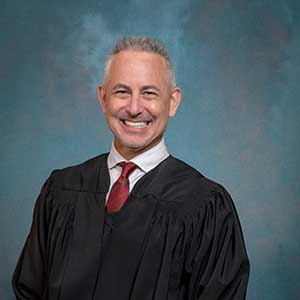 Daniel Lowenthal
Daniel Lowenthal
Judge
Superior Court of Los Angeles County
Danny Lowenthal has served as a Superior Court Judge since January 2007 and currently presides over a felony courtroom at the Long Beach Courthouse.
Judge Lowenthal authored legislation that conferred judges with the discretion to extend diversion to low-level offenders. He is currently working on legislation that would require counties to create dedicated resentencing courts to reevaluate sentences that no longer serve the interests of justice.
Judge Lowenthal was honored as Judge Of The Year by the Long Beach Bar Association in 2019 and received the Judicial Excellence Award from the Los Angeles County Criminal Courts
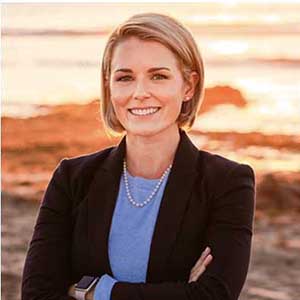 Kaitlyn McCarthy
Kaitlyn McCarthy
Attorney
County of San Diego, Office of the Public Defender
Kaitlyn McCarthy is an attorney with the County of San Diego Office of the Public Defender.
Kaitlyn has been leading the San Diego Public Defender’s 1172.1 Resentencing Unit since its inception in 2022. In addition to litigating CDCR and DA recommendations for resentencing, Kaitlyn worked with the Court and the District Attorney to create a streamlined process for evaluating and litigating petitions under AB600. The unit also provides comprehensive reentry planning to ensure clients’ post-release success and is working with a local university on a longitudinal study of resentencing and recidivism.
Thomas Nosewicz
Legal Director
California Committee on Revision of the Penal Code
Thomas Nosewicz is the Legal Director for the California Committee on Revision of the Penal Code, a state entity established in 2020 to make recommendations to rationalize and simplify California’s criminal law. He was previously a public defender in New York City and New Orleans, a staff attorney at the Prison Law Office in Berkeley, California, and a law clerk for the Hon. Victor Marrero of the Southern District of New York. He is a graduate of Stanford Law School and UC Berkeley.
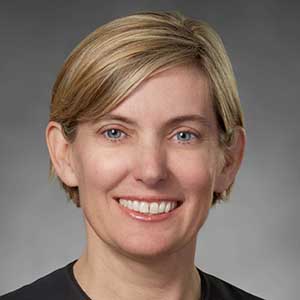 Lisa R. Rodriguez
Lisa R. Rodriguez
Judge
San Diego Superior Court
Judge Lisa Rodriguez graduated from the University of California, San Diego, in 1991 with a B.A. in Communications, earned her J.D. in 1995 from the University of San Diego, School of Law, and in 2010, received an Ll.M. in Prosecutorial Science from Chapman University School of Law. Judge Rodriguez was a San Diego Deputy City Attorney for two years, and then Deputy District Attorney for almost seventeen years. Judge Rodriguez was appointed to the San Diego Superior Court in April of 2015. Prior to her appointment, Judge Rodriguez was the Chief of the Collaborative Courts Division at the District Attorney’s Office, and trained Prosecutors, Defense Attorneys, the Bench and many outside agencies, including the American Bar Association and the California District Attorneys Association on topics such as sentencing and reentry. Judge Rodriguez is currently the vice chair of the Judicial Council’s Criminal Law Advisory Committee and was the co-chair of the Pretrial Detention Reform Workgroup. Since her appointment, Judge Rodriguez has continued to participate in legal education and regularly teaches for CJER, Judicial Council and the San Diego Superior Court on topics such as felony sentencing, pretrial detention, sex registration, self-representation, and new laws. She is also an adjunct professor at USD Law School.
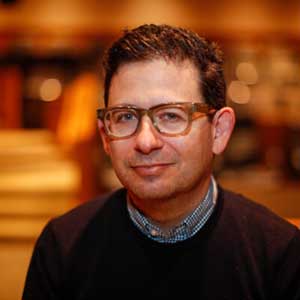 Michael Romano
Michael Romano
Director, Three Strikes Project; Lecturer in Law
Stanford Law School
Michael Romano is the director and founder of the Three Strikes Project at Stanford Law School. Previously, he was founding director of the Stanford Criminal Defense Clinic. He currently teaches criminal justice policy and advanced criminal litigation and has published several scholarly and popular press articles on criminal law, sentencing policy, prisoner reentry and recidivism, and mental illness in the justice system. In 2019, Governor Gavin Newsom appointed Michael as inaugural chair of California’s criminal law and policy reform committee, the California Committee on the Revision of the Penal Code. Michael has been at the forefront of criminal law reform and litigation for over decade.
He was principal author of the Three Strikes Reform Act (Proposition 36), one of the country’s first criminal justice reform initiatives, which led to the release of over 3,000 people serving life sentences for non-serious, non-violent crimes. He has gone on to develop and co-author numerous other reforms and led impact litigation, which together have resulted in reduced sentences for tens of thousands of additional people. Michael also founded the Ride Home prisoner reentry program, which has provided immediate assistance to formerly incarcerated people in 38 states and in 2015 partnered with the U.S. Dept. of Justice in support of President Obama’s executive clemency initiative. The work received numerous honors, including recognition by the White House as a “Champion of Change.”
In addition, with assistance from his students, Michael represents incarcerated individuals in state and federal courts, winning the reversal of over 200 life sentences. Michael is also counsel for the NAACP Legal Defense and Educational Fund and has partnered with law enforcement and other leaders at all levels of local, state, and federal government. The New York Times called Michael’s work “a proven path to clearing out its overcrowded prisons,” and The Economist called him “a voice for the forsaken.” He has been named one of California’s top lawyers and his work has been profiled in several news outlets, including The New York Times Magazine, Rolling Stone, The Economist, and the award-winning PBS feature documentary The Return
Michael graduated with honors from Stanford Law School in 2003 and was a John Knight Fellow at Yale Law School. He clerked on the U.S. Court of Appeals for the Ninth Circuit.
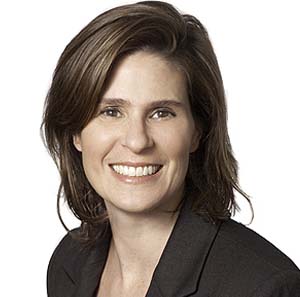 Heidi Rummel
Heidi Rummel
Clinical Professor of Law and Director, Post-Conviction Justice Project
University of Southern California Gould School of Law
Heidi Rummel directs the Post-Conviction Justice Project at the University of Southern California Gould School of Law. Under her supervision, second and third-year law students represent clients serving life terms in California prisons, many of whom were sentenced for crimes they committed in their youth. The Project has won the release of more than 250 clients through the parole process, on habeas corpus challenging the denial of parole, on resentencing petitions, and on habeas corpus challenging murder convictions where expert testimony of intimate partner violence was not admitted at trial. Since 2012, the Project has won the release of 25 clients sentenced to life without the possibility of parole on constitutional challenges to their sentences, petitions for resentencing, and parole hearings.
Rummel has worked to pass significant legislative reforms in California, including expanding the scope of habeas relief for people with a history of intimate partner violence related to their crime (AB 593 amending Penal Code § 1473.5); requiring the parole board to give specialized consideration to a history of intimate partner violence at parole hearings (AB 1593 amending Penal Code § 4801); creating a process for 16 and 17-year olds sentenced to life without parole to petition for a resentencing hearing (SB 9 amending Penal Code § 1170(d)); creating the Youth Offender Parole Hearing process (SB 260, SB 261, and AB 1308 amending Penal Code §§ 3051 and 4801); revising the fitness criteria for juveniles to be transferred to adult court (SB 382 amending Penal Code § 1170.17 and Welfare and Institutions Code § 707); creating a constitutional remedy for 16 and 17-year olds sentenced to life without possibility of parole (SB 394 amending Penal Code § 3051); and providing legal consultation to minors prior to custodial interrogation (SB 395 amending WIC § 625.6).
Prior to joining the USC Gould School of Law faculty, Rummel served in the United States Attorney’s Office in Los Angeles from 1996-2005 prosecuting federal criminal civil rights offenses, including human trafficking, police misconduct, and hate crimes. She also prosecuted gang crimes, arson cases, and child pornography offenses, and served as deputy chief in the General Crimes Section. Previously, Rummel was an Assistant United States Attorney for the District of Columbia, where she handled state court prosecutions and appellate matters.
In 2020, Rummel founded Parole Justice Works, a non-profit whose mission is to promote meaningful and effective participation in California’s parole process through training, education and empowerment for all participants in the process: state-appointed parole attorneys, people in prison, and victim/survivors.
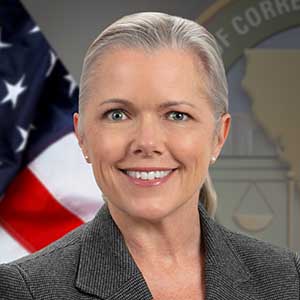 Jennifer Shaffer
Jennifer Shaffer
Executive Officer
California Parole Board of Parole Hearings
Since 2011, Jennifer Shaffer has served as the executive officer for the California Board of Parole Hearings, where she oversees a board comprised of 21 commissioners and 300 employees. During her tenure, California has dramatically expanded discretionary parole opportunities, especially for those serving lengthy prison sentences. This has resulted in more than 13,000 grants of parole, the overwhelming majority of which were issued to persons serving a term of life with the possibility of parole for crimes such as murder, manslaughter, or kidnapping. The increase in parole grants has occurred using a process that honors the rights of the incarcerated and crime victims, while maintaining public safety with violent recidivism rates consistently below 1 percent after three years of release. During her tenure, the Board implemented changes in the law governing youthful offenders, elderly parole, and nonviolent offenders serving life-terms under the state’s Three Strikes Law. In addition, the Board implemented an evidence-based structured decision-making framework anchored by risk assessments conducted by forensic psychologists, and dramatically expanded its professional training of hearing officers. Shaffer currently serves as regional vice president and Professional Development Committee Chairperson for the Association of Paroling Authorities International. From 2006 to 2011, she served with the California Office of the Inspector General overseeing investigations of alleged misconduct by correctional staff in California prisons. From 2004 to 2006, she served as assistant secretary for the California Department of Corrections and Rehabilitation, where she was responsible for victim and survivor rights and services. She also previously served as staff counsel and deputy executive officer for the California Victim Compensation and Government Claims Board from 1997 to 2004, counsel to the Assembly Committee on Public Safety for the California State Legislature in 1996, and graduate legal assistant for the California Office of the Attorney General, where she worked on a variety of legislation involving public safety and crime victims’ rights. She received her Bachelor of Arts in Economics from the University of California, Davis and her juris doctorate from Lincoln Law School of Sacramento.
Thomas E. Stevens
Judge
Superior Court, County of Alameda
Judge Stevens was appointed to the Alameda County Superior Court in November 2014, by Governor Jerry Brown. During his tenure on the court, Judge Stevens has served in the family law (2015 – 2016) and criminal (2016 – present) departments. He is currently assigned to Department 13, where he presides over a variety of matters including writs of habeas corpus, petitions for resentencing, and preliminary hearings.
Prior to his judicial appointment, Judge Stevens prosecuted federal economic crimes for the USDOJ in Washington D.C. and the Bay Area from 2004 through 2014. Before joining the DOJ, Judge Stevens practiced civil litigation at an international law firm (1997 – 2004), served as a deputy district attorney (1995 – 1997), and was a law clerk for a federal judge in the Eastern District of California (1994 – 1995).
Judge Stevens earned his JD from the University of California, Berkeley School of Law (1993), and his Bachelor of Arts degree from the University of California, Davis (1989).
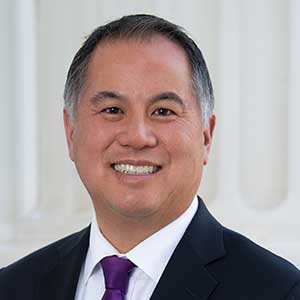 Phil Ting
Phil Ting
California State Assembly, District 19 Phil Ting was elected to the State Assembly in 2012, representing the 19th Assembly District, which spans the Westside of San Francisco, as well as the communities of Broadmoor, Colma, Daly City, and parts of South San Francisco and San Bruno.
Because of his experience in the financial sector and as the San Francisco Assessor-Recorder, Ting has become a leading voice on California’s finances. He served as Chair of the Assembly Budget Committee for eight budget cycles after having served as Chair of the Assembly Committee on Revenue and Taxation.
Ting has authored legislation that:
- Directs emergency aid to California cities and counties to address the state’s homeless crisis;
- Adds affordable housing by making it easier to add backyard cottages & other accessory dwelling units (ADUs) on existing properties;
- Creates green jobs by upgrading old HVAC systems in public schools and accelerating electric vehicle charging station installations;
- Implements the world's strongest standards, requiring plastic bottle manufacturers to include recycled materials in CRV beverage containers;
- Funds more services and resources to stop hate against the Asian American community;
- Strengthens the state's red flag gun law by expanding the list of people who can file a gun violence restraining order (GVRO) with the court, temporarily taking away someone's firearms if they pose a danger to themselves or others;
- Empowers the Attorney General and Californians to sue manufacturers and sellers of firearms for the harm caused by their products;
- Simplifies the Cal Grants applications process so that thousands more students can attend college;
- Bolsters healthy eating by helping corner stores purchase refrigeration units and maximizing food stamp redemption at farmers’ markets;
- Ensures safe and equal restroom access and tax fairness for the LGBT community;
- Reforms the criminal justice system through new resentencing guidelines for those serving unjustly long prison terms; a lower age for elderly parole considerations; and automatic expungement for low level offenses
- Rebuilds trust between police officers and the communities they serve by requiring disclosure of body camera footage and banning use of unreliable facial recognition software in those cameras;
- Promotes safe walking and limits unjust enforcement by prohibiting law enforcement from citing individuals for jaywalking unless there is an immediate danger of a collision with a moving vehicle;
- Creates the first statewide drug and medical needles take-back program funded by the pharmaceutical industry.
Ting is a graduate of U.C. Berkeley and Harvard University’s John F. Kennedy School of Government. He began his career in public service as the Executive Director of the Asian Law Caucus, an organization founded in 1972 to advance and promote the legal and civil rights of the Asian Pacific Islander community, and once served as Community Relations Director at San Francisco State University. In 2005, Ting was appointed Assessor-Recorder of San Francisco by then-Mayor Gavin Newsom, where he closed a five-year assessment backlog and brought in $290 million in unpaid property taxes to the city. Ting lives in San Francisco’s Sunset District with his family.
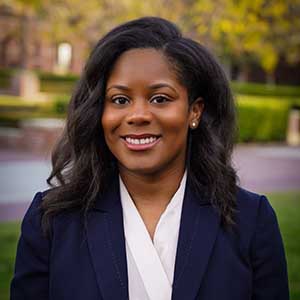 Danielle Wilkins
Danielle Wilkins
Attorney/Legal Fellow, Post-Conviction Justice Project
USC Gould School of Law
Danielle Wilkins is a proud alumna of USC Gould School of Law (’22), and current Staff Attorney and Clinical Legal Fellow at the USC Gould School of Law Post Conviction Justice Project. Her fellowship was made possible through a generous grant from the Kautz Family Foundation. Originally from Brooklyn, New York, Danielle graduated from Spelman College with a B.A. in Economics and a minor in Management. Prior to law school, she worked as a systems and management consultant in the finance, technology, and media industries. Danielle chose to attend law school to pursue a career in criminal justice and prison reform. While at Gould, she demonstrated a tireless commitment to these and other public interest pursuits. Danielle participated in the Legislative Policy Practicum, taught by Heidi Rummel (USC) and Elizabeth Calvin (Human Rights Watch), advocating for juvenile justice reforms through state legislation, and served as the Pro Bono Co Chair and 3L Advisor to the Barbara F. Bice Public Interest Law Foundation. In her third year, she was selected by faculty, staff, and fellow students to receive the prestigious Miller-Johnson Equal Justice Prize. She enjoys cooking, spending time at the beach, and reading a good novel.
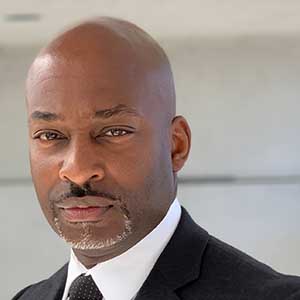 Brendon D. Woods
Brendon D. Woods
Chief Public Defender, Alameda County Public Defenders
In December 2012, Brendon Woods was appointed Chief Public Defender of Alameda County. He is the first Black Chief Public Defender in Alameda County history and one of only two Black Chief Public Defenders in California. Woods leads his office of 200 attorneys, investigators, and support staff, operating out of five offices, in providing the highest level of holistic legal defense in 26,000 cases per year. In 2013, his office was named Law Office of the Year by the Alameda County Bar Association. Woods is a nationally recognized leader and innovator in public defense. He is a Board Member and former President of the California Public Defenders Association (CPDA) and in 2016 was honored with the Harvard Law School Wasserstein Public Interest Fellowship for his outstanding public service accomplishments. He shares his expertise at speaking engagements around the country and is considered an expert in holistic representation, racial profiling, community empowerment, police reform, and models of immigration representation.
Woods’ commitment to providing inspired holistic representation to his clients led him to hire full-time social workers to link clients with essential services and provide alternatives to incarceration, to establish a Clean Slate program, and to shift from horizontal to vertical representation for most cases to further improve client services. Woods also hired immigration attorneys, making his office the first in the country outside of New York to implement immigration representation within the Public Defender’s Office. His Immigration unit was named CPDA Program of the Year in 2016.
Woods’ office hosts an annual Community Block Party, building relationships with the community and linking them to much needed services. Woods also developed a youth know-your-rights program, LYRIC (Learn Your Rights In California), to empower Black and Brown high school students; in 2015 this program was honored with the Achievement Award from the National Association of Counties (NACo) and the Program of the Year Award from CPDA. In 2017, Woods’ VOICE (Voter Outreach Increases Community Empowerment) program received the CPDA Program of the Year Award; VOICE has registered over 1,000 incarcerated individuals to vote.
Prior to Woods’ appointment, the Alameda County Public Defender’s Office was rarely engaged in the politics or media surrounding criminal justice, law enforcement, or civil rights. Woods, though, is determined to take positions on any and all issues impacting his clients. He created his office’s first policy and legislation committee and has actively engaged with the media to shed light on instances of law enforcement misconduct; Woods and his staff kneel, march and protest proudly for Black Lives Matter; and in December 2014, his office created a Racial Justice Committee, charged with addressing systemic racism in the local criminal legal system.
From a young age, Brendon Woods had formative experiences with law enforcement which influenced his desire to be a Public Defender. Now, he feels fortunate to fight for those who are battling systems of oppression and strives to reshape the discourse and nature of public defense and criminal justice as a whole.
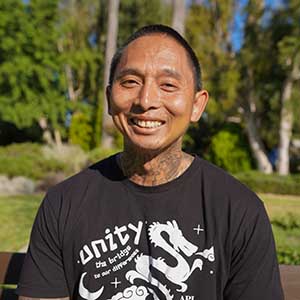 Dara Yin
Dara Yin
Program Specialist
API Rise
Dara Yin is a Program Specialist with API RISE and BAM Lead Navigator with Boyle Heights Arts Conservatory in the Los Angeles area. He is Khmer (Cambodian), and grew up in Long Beach, California. In 2004, when Dara was 19 years old, he went to prison under a Life Without Parole (LWOP) sentence. He was blessed to be commuted by Governor Newsom in January 2022 to 18-years-to-life, and has been home since November 2022. He is currently enrolled at University of Southern California (USC), pursuing a Master’s degree in Education, specifically in the Learning, Design, and Technology program. Dara strongly believes in the transformative power of education to address issues like poverty, systemic racism, and violence, and hopes to leverage his education and skills to empower communities.